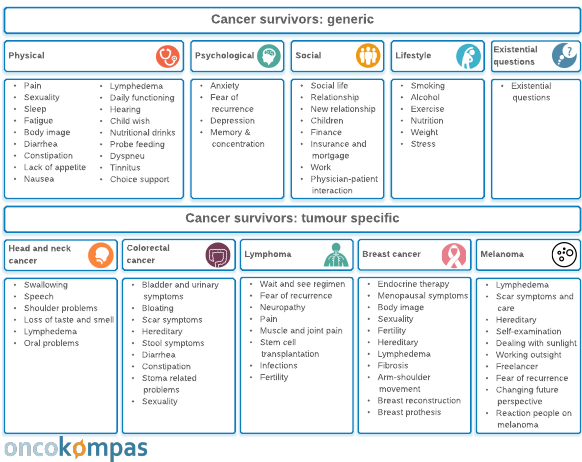Providing supportive cancer care in a personalized, tailored and cost-effective way is a challenge. Many cancer survivors want to self-manage the physical and/or psychosocial consequences of cancer, but they need to be equipped with the tools to do so. Oncokompas is a web-based eHealth application designed to support cancer survivors in self-management. The program has been shown to reduce the burden of symptoms and improve the health-related quality of life, without adding to costs from a societal and healthcare perspective.
Oncokompas is a fully automated behavioral intervention technology (BIT) consisting of the components Measure, Learn, and Act. In the Measure component, users self-monitor symptoms via generic topics relevant for all cancer survivors and some tumor-specific topics (currently for survivors of head and neck, breast, colorectal cancer, lymphoma and melanoma).
In the Learn component, algorithm-produced scores are accompanied by automatically generated feedback, information and tips to manage symptoms, tailored to the individual patient.
In the Act component, Oncokompas provides options for supportive care ranging from self-help to professional care, e.g. a psychologist, accompanied with contact information and a map to the nearest specialized psychologist, extracted from the Dutch Cancer Referral Guide.
In practice, Oncokompas was shown to enhance the quality of cancer care by reducing symptom burden and improving quality of life. However, significant improvement in knowledge or confidence was not observed; supportive care delivered by healthcare providers remains important, e.g. for patients who do not have the skills to self-manage their care and for patients with complex care needs.
Clinical trials with Oncokompas
A randomized controlled trial among 625 cancer survivors (head and neck, breast, colorectal cancer and lymphoma) in 14 hospitals in the Netherlands showed that Oncokompas did not significantly improve knowledge, skills or confidence for self-management. However, the study showed it can help support cancer survivors by potentially reducing symptom burden for some tumor types and improving health-related quality of life. The health-related quality of life effect was found directly post-intervention, and was sustained over time, suggesting that patients experienced this benefit soon after using the application. Other effects were not evident until follow-up, and it may be that some patients needed more time to follow-up the given advice and use supportive care options. The authors note that study participants were often long-term survivors of early stage cancer doing relatively well, which may have limited the potential beneficial effects of Oncokompas. More research is ongoing regarding the engagement of cancer survivors and the influence of sociodemographic, clinical and psychosocial factors on the efficacy of Oncokompas.
Cost-utility research, including direct medical, direct non-medical and indirect non-medical costs, showed that the mean total costs in the intervention group were slightly, but non-significantly, lower than the mean total costs in the control group. ‘Quality of life years’ were similar in both groups. Oncokompas is considered to be equally effective in terms of utilities, and not more expensive compared to care as usual.
Oncokompas was recently adapted for incurably ill cancer patients and their partners. Currently, two randomized controlled trials on efficacy and cost-utility are ongoing.

The PROM scores on each topic are processed in real-time by algorithms. All calculations are based on validated cut-off scores, or on Dutch practice guidelines and/or consensus by experts (patients, physicians, nurses, dieticians, physiotherapists, psychologists, researchers, and other experts, dependent on topic). The calculations result in an overview of red/orange/green scores on each topic.
In the Learn component, these scores are accompanied by automatically generated feedback, information, and tips to manage symptoms, tailored to the individual patient.
In the Act component, Oncokompas provides options for supportive care for each topic. Options range from self-help (in case of an orange score) to professional care (in case of a red score) e.g. a psychologist, accompanied with contact information and map to the nearest psychologist specialized in cancer extracted from the Dutch Cancer Referral Guide.
Considering the available evidence (read more about this at the end of this article), Oncokompas contributes to good quality cancer care and may ease the pressure on current and future cancer care. However, supportive care delivered by health care providers remains important, e.g. for patients who do not have the skills to self-manage their care and for patients with complex care needs.
More information
A randomized controlled trial among 625 cancer survivors (head and neck, breast, colorectal cancer and lymphoma) in 14 hospitals in The Netherlands showed that Oncokompas did not significantly improve knowledge, skills and confidence for self-management (possibly because the study population was already performing relatively well), but is effective to reduce symptom burden and improve health related quality of life. Some effects were found directly post-intervention, and sustained over time suggesting that providing survivors with tailored information and advice only, may already improve HRQOL instantly. Other effects did not come until follow-up and it may be that survivors need time to follow-up the given advice(s) and use supportive care options. It may also be that survivors returned to Oncokompas during the follow-up period to address new topics they did not address in the first place.
Cost-utility research, including direct medical, direct non-medical and indirect non-medical costs, and quality of life showed that incremental costs were −€163 and incremental QALYs were 0.0017 in the intervention group compared to the control group (care as usual). Sensitivity analyses, corrected for baseline scores, showed that the incremental costs varied between −€40 and €69 euro, and incremental QALYs between −0.0023 and −0.0057. Oncokompas is considered to be equally effective in terms of utilities, and not more expensive compared to care as usual.
Oncokompas is recently adapted for incurably ill cancer patients and their partners. Currently, two randomized controlled trial on efficacy and cost-utility are ongoing.







